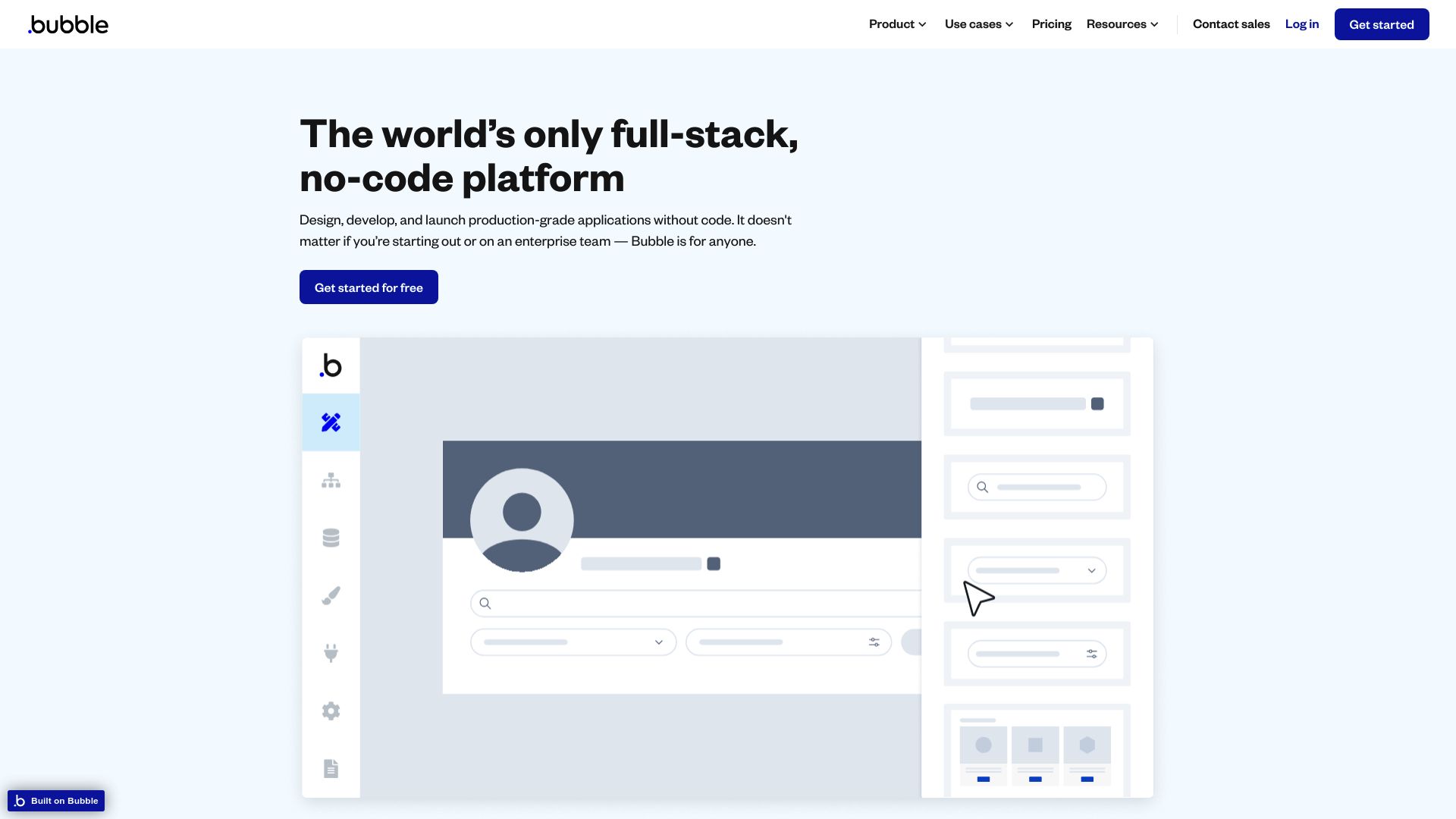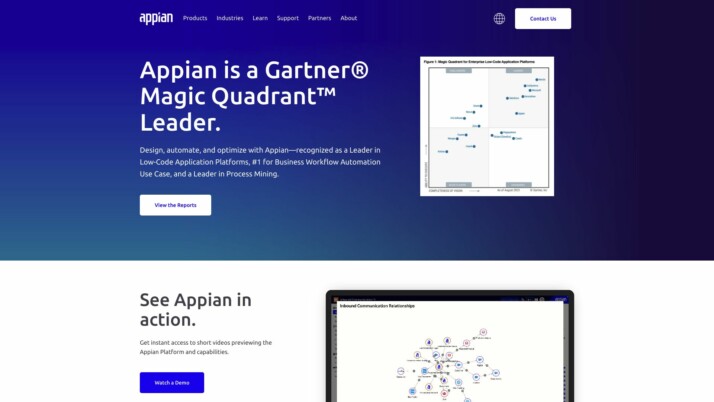Bubble vs. Appian: AI-Powered Development Platforms Compared
AI platforms revolutionize how businesses create applications and automate processes. This comparison explores Bubble vs. Appian, and SmythOS, three leading solutions in the AI-powered development space. Bubble offers a no-code approach to web application building, while Appian specializes in low-code AI integration for business process automation. SmythOS emerges as a comprehensive platform, combining visual development with advanced AI capabilities.
We’ll examine each platform’s strengths, limitations, and unique features to help you determine which best suits your organization’s needs. Whether you’re a developer seeking powerful customization options, a business leader focused on scalability and security, or a non-technical user looking for accessible AI tools, this analysis provides valuable insights to guide your decision-making process.
Bubble Overview
Bubble empowers users to build web applications without writing code. This visual development platform caters to entrepreneurs, small businesses, and enterprises seeking to create custom software solutions rapidly.


Bubble’s drag-and-drop interface allows users to design, develop, and launch fully functional web applications. The platform integrates seamlessly with popular APIs and services, enabling the creation of complex, data-driven applications. Users can incorporate AI functionalities through plugins and API connectors, adding features like chatbots and content generation to their projects.
Bubble’s drag-and-drop interface allows users to design, develop, and launch fully functional web applications. The platform integrates seamlessly with popular APIs and services, enabling the creation of complex, data-driven applications.
The platform offers both development and production environments, facilitating testing and deployment. Bubble’s visual approach to application building makes it accessible to non-technical users while providing enough depth for experienced developers. The platform includes debugging tools, allowing users to inspect elements and workflows to ensure smooth operation.
Bubble emphasizes scalability and security, leveraging Amazon Web Services infrastructure to support growing user bases. The platform implements data encryption and supports OAuth for authentication, addressing key security concerns for businesses. While Bubble excels in web application development, it lacks some specialized AI agent features like autonomous agents or built-in explainability tools.
For teams and businesses, Bubble supports collaborative development, allowing multiple team members to work on a project simultaneously. The platform’s extensive plugin ecosystem and API integrations enable users to extend functionality and connect with various third-party services, enhancing the versatility of applications built on Bubble.
Appian Overview
Appian transforms complex business processes into streamlined, intelligent workflows through its low-code AI integration platform. The software empowers organizations to harness AI capabilities without extensive data science expertise, democratizing access to advanced automation and decision-making tools.


At its core, Appian offers a suite of AI-powered features designed to enhance business operations. The platform’s low-code environment enables rapid development and deployment of AI models, making it accessible to users across various technical skill levels. Appian’s AI Skill Designer allows for the creation of custom AI models, while pre-built capabilities like document classification and extraction automate routine tasks.
Appian transforms complex business processes into streamlined, intelligent workflows through its low-code AI integration platform.
Appian prioritizes data privacy and security, ensuring AI models and data remain under the user’s control. This approach addresses critical concerns for businesses handling sensitive information. The platform’s integration with generative AI technologies, such as OpenAI’s GPT, further expands its capabilities in natural language processing and task automation.
Appian’s Enterprise Copilot feature stands out by enabling quick information retrieval from curated document sets, enhancing decision-making processes. The platform’s extensive automation tools combine AI with robust process management capabilities, streamlining operations and improving accuracy across various business functions.
Appian’s Enterprise Copilot feature stands out by enabling quick information retrieval from curated document sets, enhancing decision-making processes.
While Appian excels in low-code AI integration and process automation, it may not fully address the needs of organizations seeking highly specialized AI agent development or those requiring extensive customization beyond its pre-built features. The platform’s strength lies in its ability to rapidly deploy AI-enhanced workflows and applications, making it particularly suitable for businesses looking to quickly leverage AI without significant investment in specialized AI development resources.
Feature Comparison
Bubble and Appian offer distinct approaches to application development and AI integration. Bubble excels with its visual, no-code platform for web application creation. Its drag-and-drop interface enables rapid development without coding skills. Bubble supports AI integration through APIs and plugins, allowing users to incorporate features like chatbots and content generation.
Appian focuses on low-code AI integration for business process automation. Its AI Skill Designer allows custom AI model creation without extensive data science expertise. Appian’s platform includes pre-built AI capabilities for document classification, extraction, and generative AI tasks. Unlike Bubble, Appian emphasizes enterprise-level features like private AI models and data security.
Both platforms lack native support for autonomous AI agents or multi-agent collaboration. Appian’s Enterprise Copilot feature outperforms Bubble in information retrieval from curated document sets. Bubble’s strength lies in web application development, while Appian specializes in AI-enhanced business workflows and process automation.
Feature Comparison Table
| Bubble | Appian | SmythOS | |
|---|---|---|---|
| CORE FEATURES | |||
| Hosted Agents (Dev, Production) | ✅ | ❌ | ✅ |
| Memory & Context | ❌ | ✅ | ✅ |
| Autonomous Agents | ❌ | ❌ | ✅ |
| Explainability & Transparency | ❌ | ✅ | ✅ |
| Multimodal | ❌ | ✅ | ✅ |
| Multi-Agent Collaboration | ❌ | ❌ | ✅ |
| Bulk Work | ❌ | ✅ | ✅ |
| Agent Work Scheduler | ❌ | ❌ | ✅ |
| SECURITY | |||
| Constrained Alignment | ❌ | ✅ | ✅ |
| IP Control | ❌ | ✅ | ✅ |
| COMPONENTS | |||
| Foundation AIs | ✅ | ❌ | ✅ |
| Huggingface AIs | ❌ | ❌ | ✅ |
| Zapier APIs | ✅ | ❌ | ✅ |
| Classifiers | ❌ | ✅ | ✅ |
| DEPLOYMENT OPTIONS (EMBODIMENTS) | |||
| Deploy as API | ❌ | ✅ | ✅ |
| Deploy as Site Chat | ✅ | ❌ | ✅ |
| Deploy as Scheduled Agent | ❌ | ❌ | ✅ |
| Deploy as GPT | ✅ | ❌ | ✅ |
| DATA LAKE SUPPORT | |||
| Hosted Vector Database | ❌ | ❌ | ✅ |
| Sitemap Crawler | ❌ | ❌ | ✅ |
| YouTube Transcript Crawler | ❌ | ❌ | ✅ |
| URL Crawler | ❌ | ❌ | ✅ |
Best Alternative to Bubble and Appian
SmythOS emerges as the superior alternative to Bubble and Appian, offering a comprehensive platform for AI agent creation and deployment. Our solution combines the best of both worlds: the visual, no-code approach of Bubble and the AI integration capabilities of Appian, while surpassing both in key areas.
Unlike Bubble’s focus on web applications or Appian’s emphasis on business process automation, SmythOS provides a versatile environment for building and managing autonomous AI agents. We offer a drag-and-drop interface that simplifies complex AI workflows, making advanced AI development accessible to users of all skill levels. This approach democratizes AI creation, allowing businesses to harness the power of artificial intelligence without extensive coding knowledge.
SmythOS provides a versatile environment for building and managing autonomous AI agents… making advanced AI development accessible to users of all skill levels.
SmythOS stands out with its support for multi-agent collaboration and orchestration. While Bubble and Appian lack native capabilities for autonomous AI agents, our platform enables the creation of interconnected AI systems that can work together on complex tasks. This feature opens up new possibilities for automation and intelligent decision-making across various business processes.
Our platform’s extensive integration ecosystem surpasses both Bubble and Appian. We provide pre-built API integrations and support for a wide range of AI models from different providers. This flexibility ensures that SmythOS can adapt to virtually any workflow or business requirement, offering a level of versatility that neither Bubble nor Appian can match.
When it comes to deployment options, SmythOS offers unparalleled flexibility. We support deployment as APIs, chatbots, scheduled agents, and even as ChatGPT plugins or Alexa skills. This versatility allows businesses to integrate AI solutions seamlessly into their existing systems and customer touchpoints, providing a significant advantage over the more limited deployment options of Bubble and Appian.
Conclusion
Bubble, Appian, and SmythOS each offer unique approaches to application development and AI integration. Bubble excels in no-code web application creation, while Appian focuses on low-code AI integration for business process automation. However, SmythOS emerges as the superior choice, combining the best of both worlds with additional advanced capabilities.
SmythOS stands out with its intuitive drag-and-drop interface, extensive integration ecosystem, and versatile deployment options. Unlike Bubble and Appian, SmythOS supports multi-agent orchestration, allowing teams of AI agents to collaborate on complex tasks. This feature significantly enhances efficiency and scalability in AI implementations.
While Bubble and Appian have their strengths, SmythOS offers a more comprehensive solution for businesses seeking to leverage AI. Its ability to integrate with over 300,000 APIs and support for various AI models from providers like OpenAI, Anthropic, and Hugging Face gives users unparalleled flexibility. Moreover, SmythOS’s ’Create Once, Deploy Anywhere’ approach allows for seamless integration across multiple platforms, including Google Vertex, Microsoft Copilot, and Amazon Web Services Bedrock.
For organizations looking to harness the full potential of AI, SmythOS provides the most robust and versatile platform. We invite you to explore our diverse range of AI-powered agent templates and experience firsthand how SmythOS can revolutionize your workflow. Get started with SmythOS today and join the AI-driven future of business automation.
Last updated:
Disclaimer: The information presented in this article is for general informational purposes only and is provided as is. While we strive to keep the content up-to-date and accurate, we make no representations or warranties of any kind, express or implied, about the completeness, accuracy, reliability, suitability, or availability of the information contained in this article.
Any reliance you place on such information is strictly at your own risk. We reserve the right to make additions, deletions, or modifications to the contents of this article at any time without prior notice.
In no event will we be liable for any loss or damage including without limitation, indirect or consequential loss or damage, or any loss or damage whatsoever arising from loss of data, profits, or any other loss not specified herein arising out of, or in connection with, the use of this article.
Despite our best efforts, this article may contain oversights, errors, or omissions. If you notice any inaccuracies or have concerns about the content, please report them through our content feedback form. Your input helps us maintain the quality and reliability of our information.
